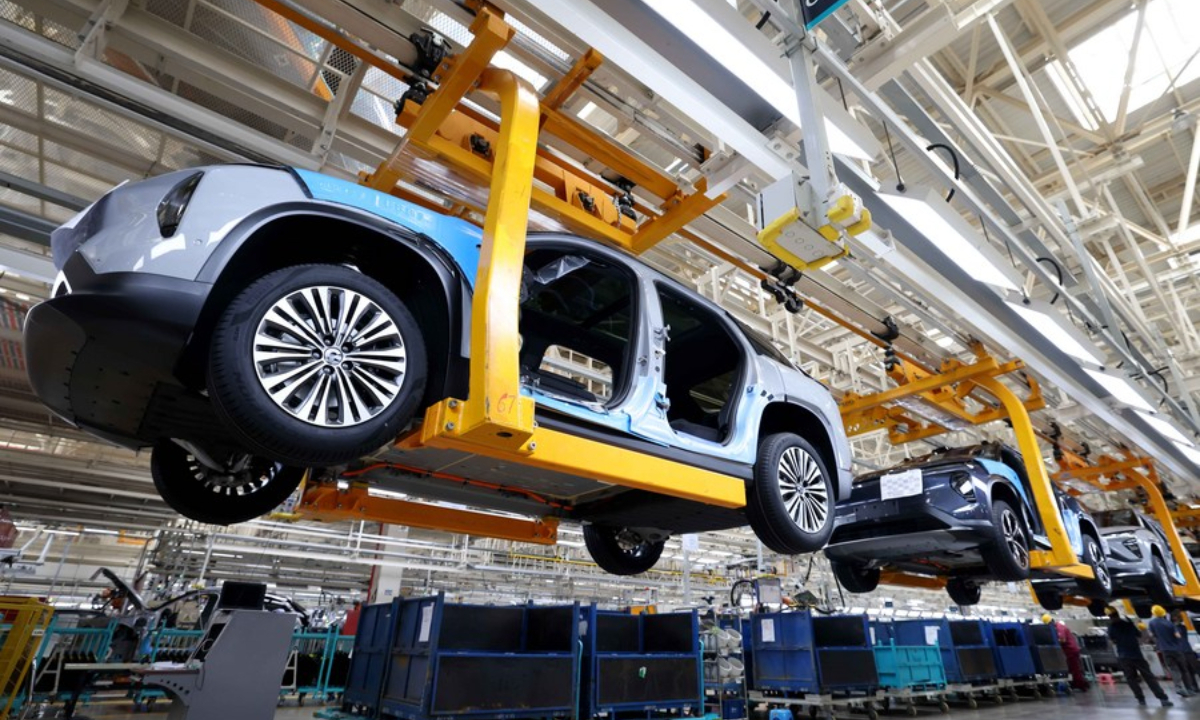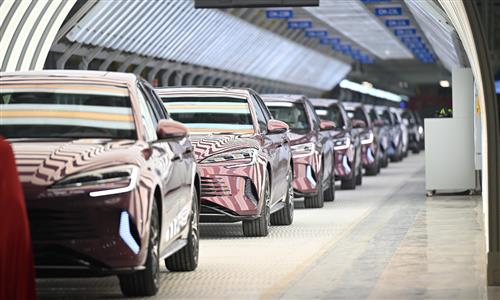
Photo taken on Aug 28, 2022 shows a complete vehicle production line at a new energy vehicle factory in Hefei, East China's Anhui Province. Photo:Xinhua
Trade protectionism measures are not helpful in solving overcapacity issues, Liao Min, China's vice minister of finance, said on Monday, in response to comments made by US Treasury Secretary Janet Yellen on Chinese new-energy products.
The comments came after Yellen attended an event with leading representatives of the American business community in China, hosted by AmCham China last Friday, raising the issue of Chinese "overcapacity" in emerging sectors such as electric vehicles (EVs) and solar panels, as well as attempts to restrict China's market access and protect their own industries through protectionist measures.
"Against the backdrop that technological progress in the new energy industry has driven in-depth adjustments to the global production and supply chain, many countries including China are facing challenges brought by such changes. Therefore, the international community should view this phenomenon objectively and make practical and rational policy choices," Liao said.
Yellen has repeatedly accused China of "overcapacity" in emerging industries, according to a Reuters report on Monday, and she has warned China that Washington will not accept new industries being decimated by Chinese imports.
China strongly opposes developed economies' use of security concerns and protectionism measures in green energy sectors, Liao said, amid Yellen's visit to China from April 4 to 9.
Applying restrictions in the new energy industry will further weaken the US' ability to address climate change, the vice minister said, adding that it will only harm their own interests. It would also infringe on the rights of Chinese companies.
The vice minister also cited a report by Bloomberg, which noted that US-Europe gripes on overcapacity in China are not always based on data.
Excess industrial capacity is a manifestation of the market mechanisms at play. It may occur in any economy that establishes a market economic system, and has also occurred multiple times in the history of Western countries such as the US, Liao said, adding that the solution to these problems mainly relies on the market and the law of value.
Current production capacity is far from meeting market demand, especially with the huge potential demand for new energy products in many developing countries, Liao said.
Taking new energy vehicles sectors as an example, according to the International Energy Agency, total EV sales will reach 45 million in 2030, which is 4.5 times that of 2022. And global installed photovoltaic capacity is set to grow to a total of 820 gigawatts, four times that of 2022.
According to data from the China Association of Automobile Manufacturers, China's production and sales of new-energy vehicles (NEVs) in 2023 totaled 9.587 million and 9.495 million units, respectively.
The EU also launched an investigation in October 2023 to determine if it should impose additional tariffs on imports of EVs from China over so-called subsidies. It was followed by the EU's launch of a special customs registration process for Chinese EVs in March.
Decrying the escalation of protectionist measures by some developed economies, Liao noted that China's new energy industry now enjoys competitive advantages, a complete industrial system, and abundant human resources after experiencing decades of rapid development. Through technological innovation, enterprises in this field have reduced production costs and improved the economic accessibility of new energy products, he said.
Liao also noted that the Western criticism understates innovation and contributions to environmental protection by companies in China. China's new-energy industry deserves to be objectively evaluated as it also helps accelerate the realization of the country's dual carbon goals, making positive contributions to global efforts to address climate change and achieve green development, the official noted.
Global Times

